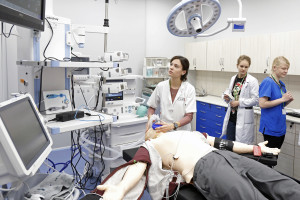GIS warning: stay away. "Dangerous bacteriological bomb"

Author: BM • Source: Rynek Zdrowia • Published: July 11, 2025 8:25 PM
During the summer heat, the risk of food poisoning increases dramatically, especially when food is stored improperly. High temperatures promote the rapid growth of dangerous bacteria, molds, and fungi, which can lead to serious health problems. The sanitary inspectorate warns that even popular products like ice cream or bottled water can become a source of dangerous microorganisms – including salmonella, E. coli, and Staphylococcus aureus – if they are not stored according to hygiene standards.
- In hot weather, improperly stored food can lead to serious food poisoning.
- - At high temperatures, food becomes an excellent breeding ground for pathogenic bacteria, fungi and molds - warns the District Sanitary and Epidemiological Station in Szczecinek
- Poisoning may be caused by, among other things, ignoring hygiene requirements.
- Salmonella or Staphylococcus aureus may appear in melted ice cream - in both cases, the consequences of consuming incorrectly stored ice cream can be dramatic.
The Sanitary Inspectorate reminds that during hot days , bread, among other things, molds more quickly, cottage cheese turns sour, and staphylococci multiply in melting ice cream .
Moreover, even mineral water, if the bottles have been standing in the sun in a store, can develop a very large amount of dangerous coliform bacteria.
"During hot weather, we should pay special attention to what we eat. At high temperatures, food becomes the perfect breeding ground for pathogenic bacteria, fungi, and molds," the District Sanitary and Epidemiological Station in Szczecinek warned on its website.
The station reported that food poisoning is particularly common during the holidays. Nausea, vomiting, abdominal pain, diarrhea, and fever can all occur after eating spoiled food.
"Therefore, on a hot day, it's best to avoid places (e.g., markets) where products are not stored refrigerated but are often "frying" in the sun. Food (even if it looks perfectly normal at first glance) then turns into a dangerous bacteriological bomb ," the press release stated.
As added, in such conditions, botulinum toxin and staphylococcus bacteria multiply in meat, for example. If it's Staphylococcus aureus, it also begins to produce a dangerous enterotoxin. According to experts, in the case of meat or dairy products, sometimes half an hour of exposure in a sunny place (at a temperature above 25°C) is enough to produce microorganisms that pose a serious threat to our health.
The Szczecinek sanitary inspectorate has advised that on hot days, it's especially important to thoroughly wash fruits and vegetables before eating them, and to throw away any spoiled produce. Furthermore, eating steak tartare is not recommended, especially if it's made from meat of unknown origin.
Food poisoning. It can be harmful.The website Patient.gov.pl also warns that summer is a prime time for food poisoning. The most common cause of food poisoning is food containing bacteria or their toxins, as well as viruses and parasites.
However, ignoring hygiene requirements, improper storage of products and failure to observe expiration dates increases the risk of food poisoning.
This can harm us, among other things:
- Campylobacter – the most common cause of food poisoning in Poland is bacteria belonging to the Campylobacter genus. They are common in poultry, but can also be found in other types of meat. Be careful with unpasteurized milk;
- Salmonella - Salmonella is a common cause of food poisoning. It is primarily found in meat, milk and dairy products, eggs, and often in seafood. In cases of food poisoning, nausea, vomiting, and bloody diarrhea may occur. If you don't belong to a high-risk group, a proper diet and medicinal charcoal will suffice. In more severe cases, antibiotics or hospitalization may be recommended.
- Botulism is one of the most serious causes of food poisoning. It can be found in canned food, preserves, and even honey. The first symptoms of poisoning include nausea, vomiting, and severe abdominal pain. Unfortunately, paralysis of specific muscle groups, double vision, and a characteristic drooping of the eyelids can also occur.
- Staphylococcus aureus is a bacterium that can also be transmitted from another person, through droplet infection or during sexual intercourse. The most common sources of poisoning include sliced cold cuts, ground meat, fish, milk and dairy products, delicatessen products, ice cream, cookies, creams, and vegetable products. The staphylococcus toxin is highly resistant to high temperatures. It does not change the taste of the product, so be vigilant and consult a doctor if symptoms of poisoning occur.
- Bacillus cereus – causes diarrhea and vomiting. Spores can survive cooking. It occurs after consuming rice, potatoes, pasta, and cheese dishes that have been kept warm.
Other causes of food poisoning include:
- Yersini – Poisoning occurs from eating or coming into contact with raw pork. Unfortunately, the bacteria is resistant to refrigeration.
- Listeria monocytogenes – as a result of eating raw vegetables and fruits, unpasteurized dairy products (milk, cheese, ice cream), raw, cooked and frozen poultry and meat, raw and smoked fish.
- Escherichia coli – generally causes urinary tract infections. It is often found in poultry, less frequently in beef or pork.
Patient.gov.pl lists a number of basic actions that can protect against poisoning:
- maintaining hygiene rules: washing raw fruit and vegetables, thoroughly cleaning the kitchen counter and food preparation areas,
- using separate boards for preparing vegetables, meat and fish,
- keeping the refrigerator clean by washing it regularly,
- store raw and ready-to-eat products separately,
- check the expiration date of all products,
- do not eat raw meat, even occasional consumption of raw or undercooked meat may result in food poisoning.
To prevent dehydration, drink adequate amounts of fluids. Ideally, this should be warm, boiled water:
- in case of mild dehydration, when the weight loss is less than 5%, you need to drink 50 ml of water per kilogram of body weight within 3-4 hours,
- in case of moderate dehydration (loss of 5–10% of body weight), 50–100 ml of water per kg of body weight,
- In addition, after passing one diarrheal stool, you should drink 5–10 ml per kg of body weight. For an adult, this is 350–700 ml after each loose stool,
- in case of vomiting, drink an additional 2–5 ml per kg of body weight, usually approximately 140–350 ml after each episode of vomiting.
Copyrighted material - reprint rules are specified in the regulations .
rynekzdrowia











